The director here is Gotou Noriko, that on her Wikipedia page is listed as a scriptwriter, and the "author" of the original story is that same Yamaoka Souhachi of another Nobunaga movie, in fact there are lots of similarities between the two plots, with some scenes that looks as if taken directly from the movie of 1959--

--I could stop the review right here, but I won't, as, despite my harsh words there are some very interesting points that deserve a further analysis.
But let's go in order, and start our reviews with Nobunaga, here played by Shirota Yu, some guy who got popular because his mother is Spanish, apparently.
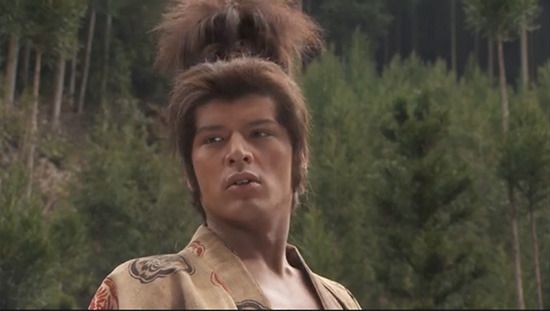
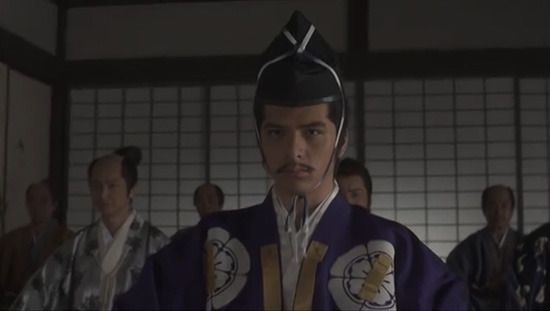
Comparing the acting of Shirota-san to the one of Nakamura Kinnosuke is pretty much mortifying, as the boy looks completely unable to make an expression. Here you can find some shots of when he's showing some emotions (he's very cute when he cries, actually), but for the most of time he is completely inexpressive! It looks like he has no idea of what to do with his face when he talks, it's really embarassing!
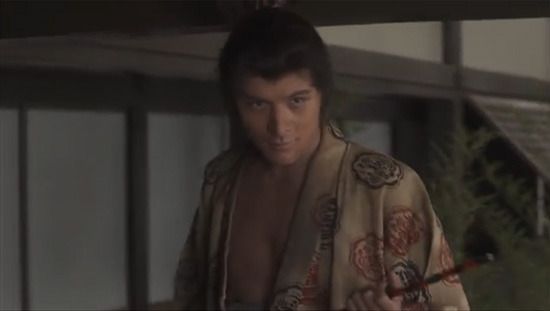
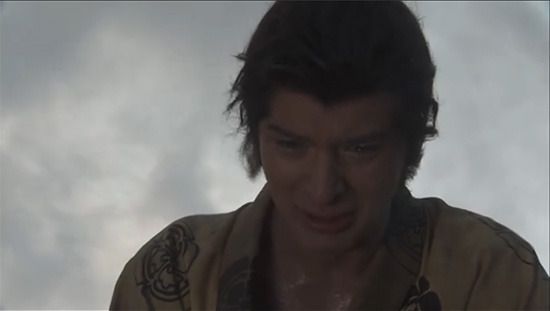
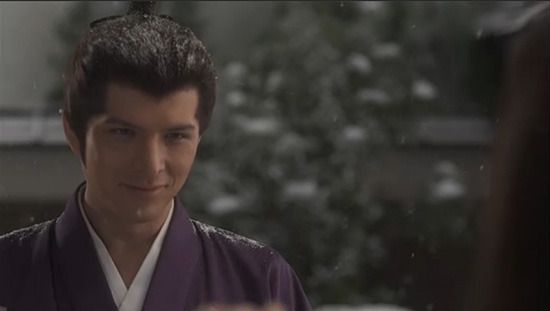
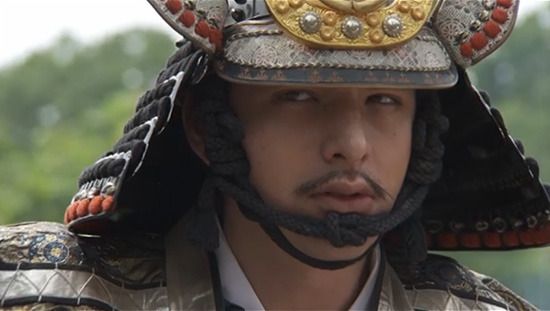
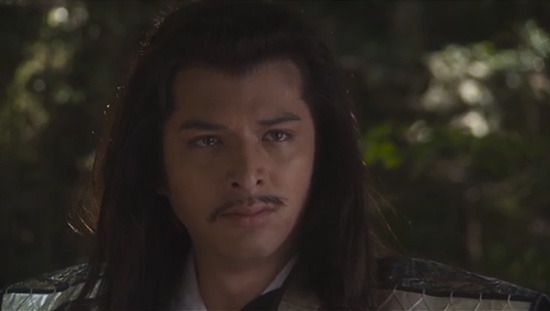
The voice of Shirota-san is extremely deep and expressive, and it's a mystery how that voice could come out of there. It's pretty much the huge mystery that is the expressivity of a seiyuu compared to that of a Japanese actor. It's as if they are taught to interprete with their voice only (I think that sentai are to blame for this)!
Speaking of the "Nobu spotlights", generally speaking the "otsuke days" amused me, expecially because, despite the absolute inexpressivity of Shirota-san, I was reminded of the Nobunaga of Ken Watanabe--
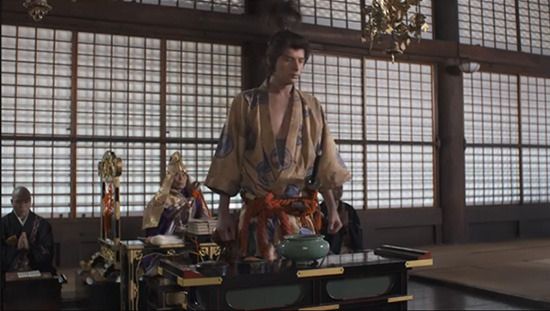
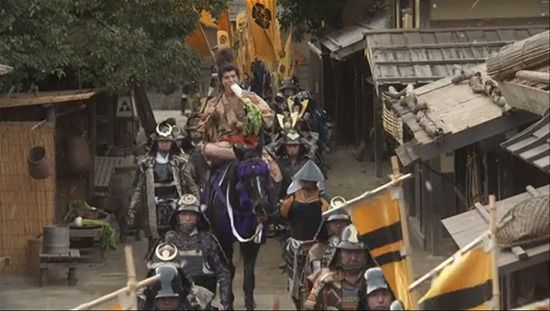
The meeting with Dosan (Satomi Kotaro) was quite interesting too. It's the carbon copy of that of the movie of 1959, but I was glad to see that Shirota-san could keep the "posture" of Nobunaga perfectly, his dignified stride in the main hall left me as speechless as Dosan & Co.
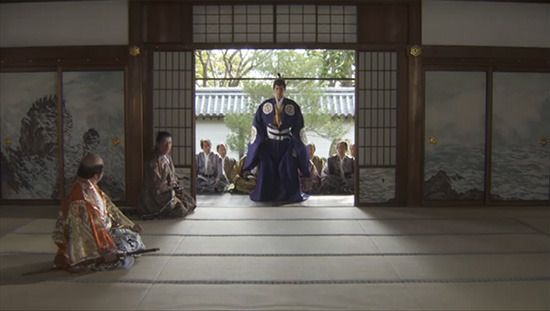
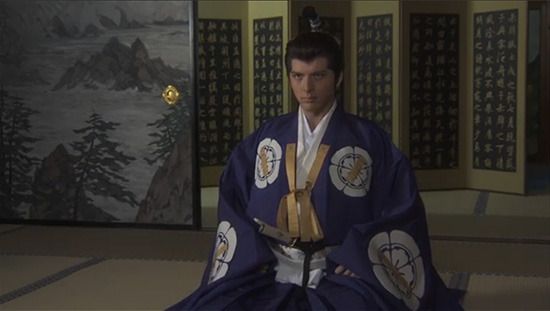
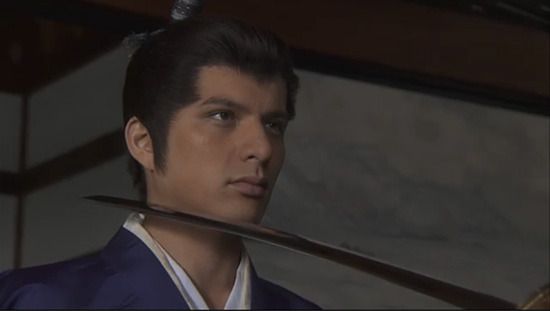
Another scene taken precisely from the novel is the death of Hirate (Sasano Takashi), with Nobunaga running away to scream the name of his tutor in the raging sea-- Again, he didn't make all that noise when his father died, LOL.
Another intereresting rendition is that of the death of Nobuyuki (Hiraoka Yuta), Nobunaga's rebellious little brother.
Nobuyuki here is represented as a good sport who loves his bro, but due to the pressure of his vassals and the detached behaviour of Nobunaga that Nobuyuki reads as hostility and aloofness, he is destined to a bitter end.
Here we have the introduction of an original character (no idea if he's from the novels or the imagination of Gotou-sensei), the retainer Hakoba Hanza (Yamane Kazuma), who, acting as Nobunaga's kagemusha, kills Nobuyuki in his place. Peculiarly moving the image of Nobunaga "witnessing" the crime in the courtyard of his castle, under the show, and almost filled with religious pathos is the scene of Dota Gozen (Yo Kimiko) drinking the cold tea once she realizes that her favourite son is dead.
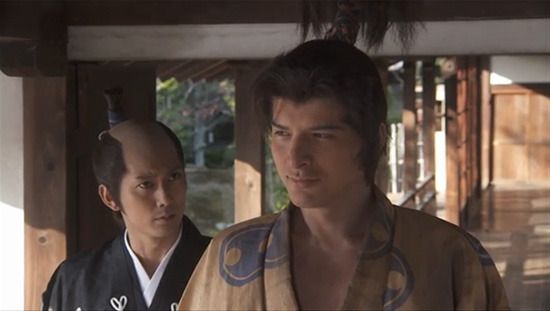
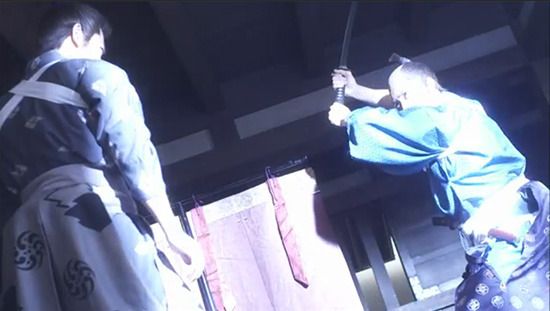
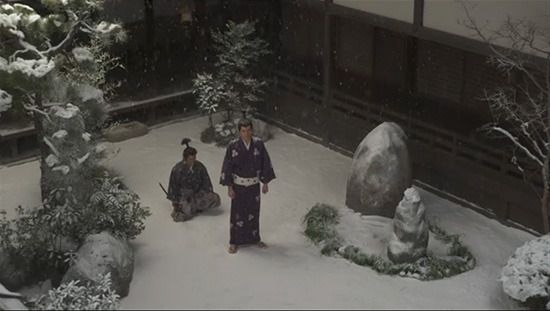
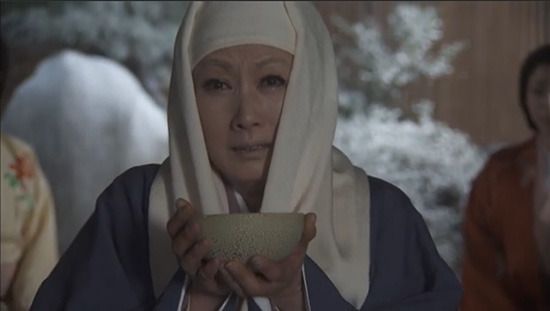
The battle of Okehazama, shown in the second movie of this series, had its interesting inaccuracies too.
Nobunaga and his men are shown heading to Atsuta shrine to receive the blessing before the battle, but the most interesting part of the battle if the face-to-face between Nobunaga and Imagawa Yoshimoto (that same Sasai Eisuke who played as Nobunaga on "The Kiyosu Conference"!):
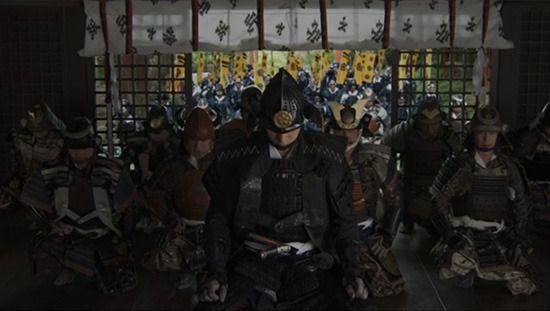
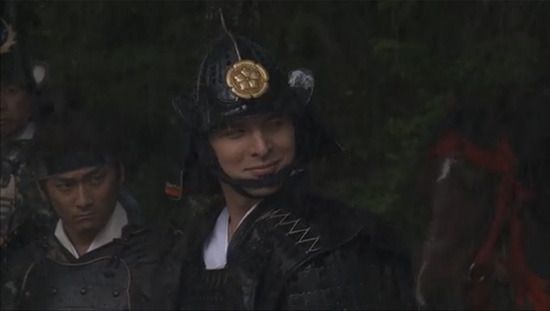
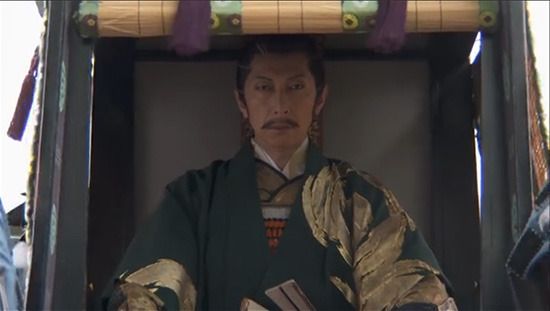
I liked this Yoshimoto: easily bothered, aloof, yet with enough warrior spirit to react to the thread and to recognize Nobunaga's weight on the battlefield, granting him even some advice before dying, like some sort of fatherly figure.
Nobunaga beheads him mercilessly, but he will treasure his words.
In these movies there's no "Atsumori" dance but there's some sort of Honnoji scene, showing Nobunaga fighting fiercely before screaming Nou's name while facing the inevitable end.
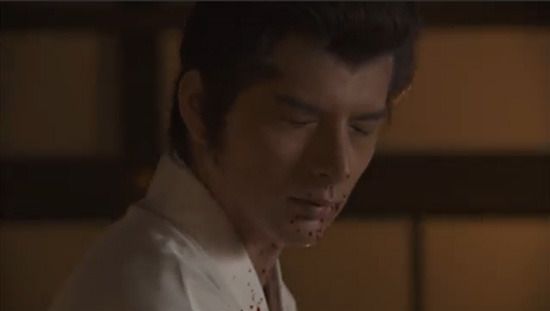
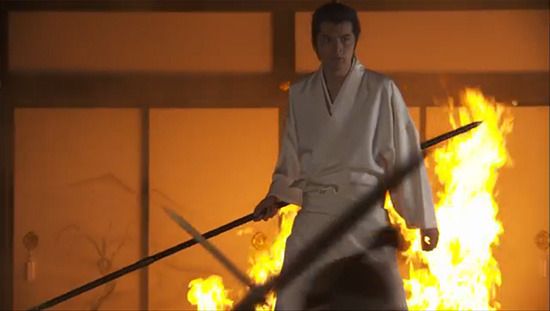
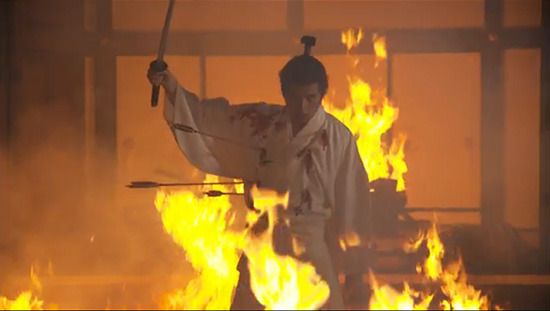
The second movie ends with the defeat of the Azai clan, and the return of Oichi, so this is all the "Honnoji time" we get.
A few words on the actual protagonist of these tv specials, Mizuki Arisa, here playing as Nouhime.

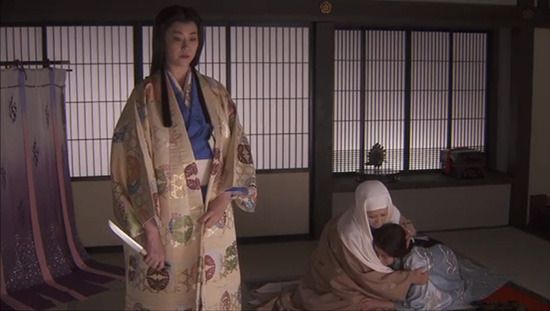
This said, her not so bright, yet quite decent performance (definitely better than Shirota-san's!), was highlighted by an interesting rendition of the character.
As in the movie of 1959 Nouhime is pretty much a human blob, I assume that these bright "intervetions" on the character belong to Gotou-san, even if, again, the similarities with the movie of 1989 are still quite stricking.
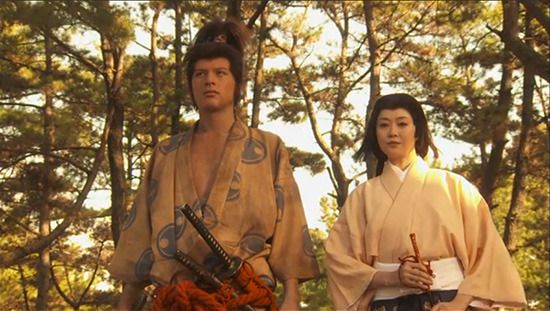
An interesting example in this sense is when Nouhime reached Nobunaga on Mount Hiei (yeah, sure!) to push her husband with the choice to burn the whole place, and her lucid and cold explanation of the facts to Mitsuhide (Okada Koki), that left him speechless.
This original interpretation of the "the wars fought by women" concept is an absolute development compared to the dullness of Gō, where the whole importance of the woman resided in the production of qualified heirs.
On the contrary, here Nouhime, unable to get pregnant, is confronted with Nene, who's facing the same problem.
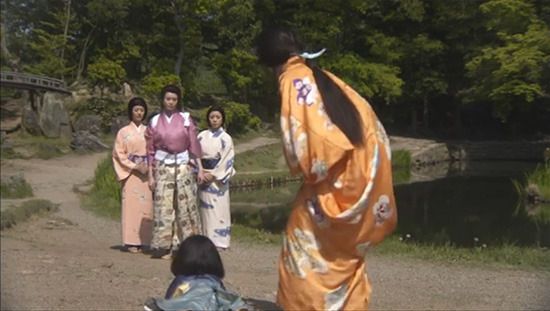
This is the interesting point that makes this movie deserving a watch, even if it's extremely boring and repetitive in certain parts (compare the death of Dosan and Nobuyuki in the first episode to the Death of Yoshimoto and Nagamasa in the second episode).
I want to close this article with a spotlight on a few interesting subjects.
First, the heraldry used in this movie.
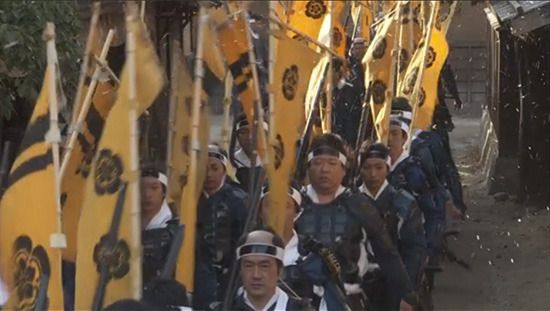
A little note on those sported by the Saito clan:
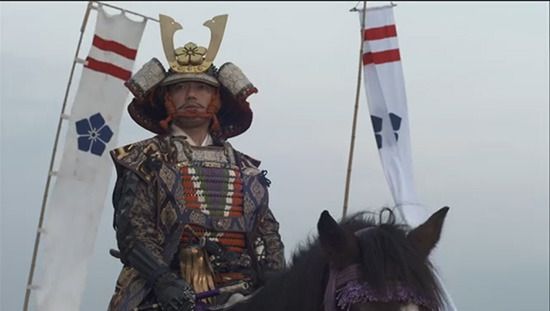
The kamon of the Saito clan of Mino is the large pink (nadeshiko), but the personal banner of Dosan is the "Double Wave" (nitonami), as correclty showed in the movie.
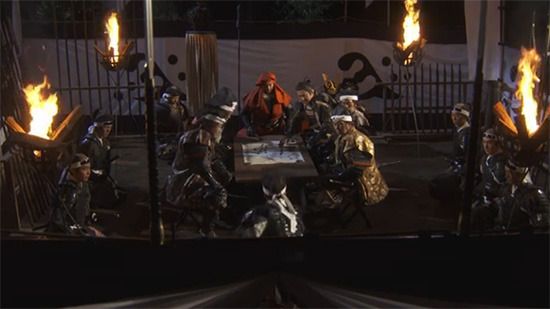
Second, a better rendition of that "lucky meal" that we spotted already on "Tokugawa Ieyasu". No wonder, both movies are based on novels written by Yamaoka Souhachi!
It can be spotted in detail during the closing credits of the first movie, and again briefly before the battle of Okehazama.
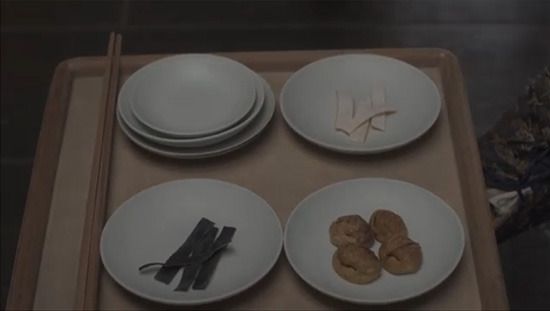
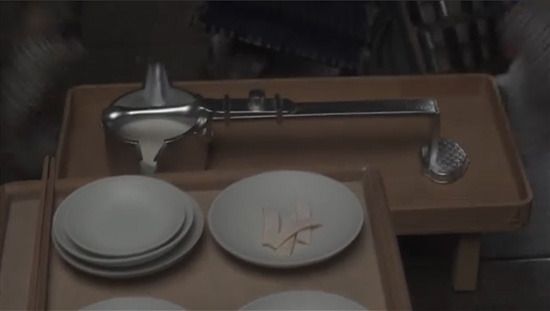
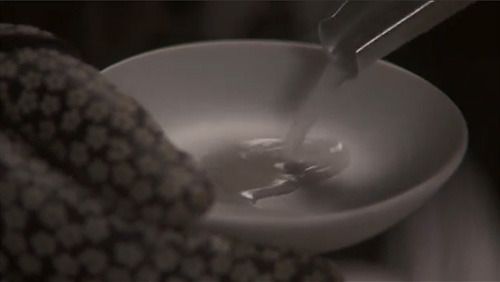
Another interesting food that makes its appearance is the chimaki:
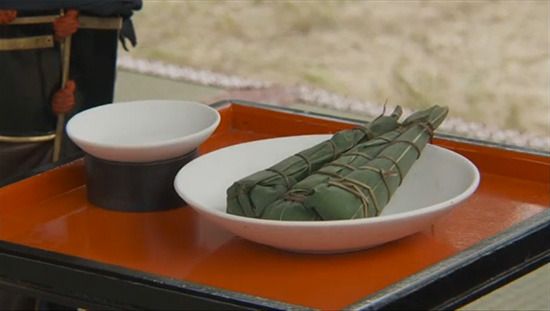
Ironically, Nouhime poisoned these and made the villangers serve them to the Imagawa troops, slowing down their reflexes and reducing their strenght for Nobunaga's attack.
And in the end, the corner of randomness!
During one of the campaigns against the Asakura and the Azai, everyone makes sure to let us know that Mori Yoshinari (Morioka Yutaka) is dead:
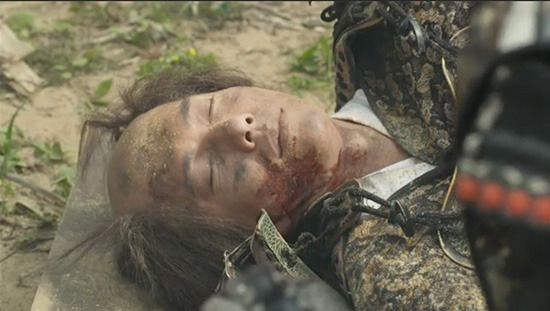
I wondered if the actor was popular but it doesn't seem the case...
So, a pretty boring tv special, but still worth a watch for its unexpectedly "revolutionary" bits on the role of the woman in society.
I guess it shows when a woman is directing...
Chimaki!! It's interesting that Nouhime would use that, because Mitsuhide's favourite food was chimaki XD It's pretty well known too. I've seen a few "samurai recipe" articles mentioning that (alongside Hideyoshi's warikayu porridge and Ieyasu's seabream tempura). Could it be to signify the connection between Nouhime and Mitsuhide?
ReplyDeleteI really don't get why people like to romanticize Nouhime's relationship with Nobu. Lamers very confidently wrote in Tyrannus that Nouhime was divorced and sent away after Nobu conquered Mino O.o But I guess people just likes fluff... And like to pair Nobu with everyone LOL. I once saw an actual published manga about Mitsuhide being a girl disguised as a man and has romance with Nobu...
Now if we could just have a good subbed version of Nenes's movie/series. I know she had at least one, but I don't remember what it was and I don't think translations are available. I'm always curious about her because she seems to have a lot of influence.
I don't think that it has a connection to Mitsuhide, I guess that it's just some good luck item.
DeleteI came to the conclusion that Nobu and Nou are portrayed as the perfect couple just because Nou was his legal wife. Japanese people are just like that XD
--And where is written that Nobu divorced Nou after the conquest of Mino..? I looked for this info on the book, and he barely talks about any woman in Nobu's life XD *investigates*
Yeah, Nene was pretty cool!
The movie dedicated to her is "Nene - Onna Taikoki" ( 寧々~おんな太閤記 )... But from what I see from the promotional art, I don't think that I will enjoy that portrayal of Nene XD
Looking forward to watch it whenever subs will be available, though!
I don't remember what page anymore D: I saw it months ago and I forgot to bookmark the page.
ReplyDeleteI just remember it was in the end notes of Tyrannus.
Haha, what was the impression you got of Nene in Onna Taikoki? I only ever saw the main movie poster, but I couldn't find reviews at the time. Maybe I should try to look it up again.
I found it! It was in the notes: "No children were produced by this first marriage, and Kicho was sent back to Mino after Saito Dosan had been killed in 1556 by his own son."
DeleteHe looks pretty confident about it XD ! I'll investigate further!
The Japanese Wiki's page of Nohime states that there are various theories, two of them talk about a divorce and a premature death...
I saw the poster and other random screenshots-- She looks all kind of educated and "noble-like"... It's very different from the image that I got of Nene, but probably all these cheap tv series are to blame, LOL!
--I think that I found the movie on Youtube? But it was in Japanese--